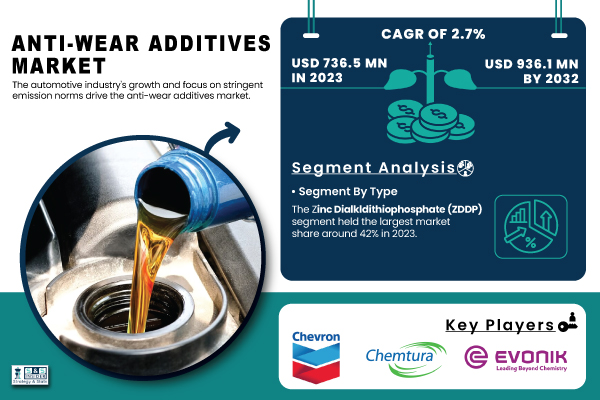Austin, Jan. 09, 2025 (GLOBE NEWSWIRE) -- As per the latest research report of SNS Insider, “The Anti-Wear Additives Market is projected to reach a valuation of USD 936.1 million by 2032, expanding at a compound annual growth rate (CAGR) of 2.7% from 2024 to 2032.”
This robust growth is fueled by the growing demand for enhanced wear protection, higher fuel efficiency, and improved machinery longevity, all of which are achievable through the use of anti-wear additives.

Download PDF Sample of Anti-wear Additives Market @ https://www.snsinsider.com/sample-request/2631
Key Companies:
- Chemtura Corporation (Durad 620C, Reolube Turbofluid 46XC)
- Evonik (ViscoTreat 301, Dynasylan Silanes)
- Chevron Oronite (Paratone 855, OLOA 48027)
- Vanderbilt Chemicals (VANLUBE 960E, MOLYPAUL 994)
- Lubrizol (Lubrizol 7723, Estane 3D TPU M95A)
- Infineum (Infineum P5351, Infineum V3000)
- Tianhe Chemicals Group (T616, T4208)
- Afton Chemical Corporation (HiTEC 1111, HiTEC 5000)
- BASF (Keropur 3700, Irganox L57)
- Croda International (Priolube 3970, Crodacol C90)
- Clariant (AddWorks LXR 568, Licocene PP MA 6452)
- Dow Chemical (UCON Fluid AP, Xiameter Silicone Fluids)
- ExxonMobil Chemical (SpectraSyn Elite 300, Mobilgard 300)
- TotalEnergies (Eolys PowerFlex, HydraSyn)
- Shell Global (Gadus S2 V220, Helix Ultra)
- Fuchs Petrolub (RENOLIN MR 520, Silkolene Pro Boost)
- LANXESS (Additin RC 9800, Durad 220A)
- Royal Purple (Max-Tane, Synfilm GT)
- Petro-Canada Lubricants (Duron-E SHP 10W-30, Purity FG2)
- Idemitsu Kosan (Zeropro 0W-20, Daphne EPI 150)
Anti-wear Additives Market Report Scope:
| Report Attributes | Details |
| Market Size in 2023 | USD 736.5 Million |
| Market Size by 2032 | USD 936.1 Million |
| CAGR | CAGR of 2.7% From 2024 to 2032 |
| Base Year | 2023 |
| Forecast Period | 2024-2032 |
| Historical Data | 2020-2022 |
| Report Scope & Coverage | Market Size, Segments Analysis, Competitive Landscape, Regional Analysis, DROC & SWOT Analysis, Forecast Outlook |
| Key Segments | • By Type (Zinc Dialkldithiophosphate (ZDDP), P-Derivative, Phosphate, Phosphonate, Phosphite) • By Application (Engine Oil, Automotive Gear Oil, Automotive Transmission Fluid, Metal working Fluid, Greases, Hydraulic Oil, Others) • By Sales Channel (Merchant, Captive) |
| Key Drivers | • Focus on High-Performance Synthetic Lubricants drives the market growth. |
If You Need Any Customization on Anti-wear Additives Market Report, Inquire Now @ https://www.snsinsider.com/enquiry/2631
Key Trends Fueling the Anti-Wear Additives Market
Sustainability and the Shift Towards Eco-Friendly Anti-Wear Additives
With growing environmental concerns, there is a gradual shift towards the use of sustainable anti-wear additives (For more information, you can check, Sustainable Anti-Wear Additives). From the European Union to the U.S. Environmental Protection Agency (EPA), regulatory bodies around the globe are advancing stricter demands to minimize the ecological footprint of lubricants and additives. This has led to the manufacture of biodegradable, low-toxicity anti-wear additives that meet environmental regulations but also combine enhanced performance.
Additives based on renewable resources are becoming increasingly important candidates for replacing conventional petroleum-based products. The increase in demand for eco-friendly lubricants such as low volatile organic compounds (VOC) or low environmental impact lubricants has been driven by the increasing adoption of these additives.
Technological Advancements in Anti-Wear Additive Formulations
In recent years, anti-wear additives have been successfully formulated with innovative technologies that help improve performance while reducing the environmental footprint. Today, modern antiwear additives work well at higher temperatures, pressures and extreme conditions allowing its usage in various industrial and automotive applications. The manufacture of nano-technology additives has also increased the wear resistance of lubricants, proving to be the best protection against wear and tear but also making them more efficient.
At the same time, the growing range of such products is aided by the multi functionality of modern additives providing protection against wear, corrosion, and anti-oxidation. These types of additives are being used more and in high-performance engines and other industrial and aerospace applications where total lubricating protection is required.
Stringent Regulatory Standards and Their Impact on Market Growth
Government regulations related to emissions, toxicity, and sustainability are a key factor influencing the development of the anti-wear additives market. Regulatory bodies around the world are enforcing stringent emission standards, driving the demand for additives that can meet these requirements without compromising performance. This has led to significant research and development efforts by major players to formulate additives that comply with global standards such as the EU's REACH (Registration, Evaluation, Authorization, and Restriction of Chemicals) regulation and the U.S. Clean Air Act.
Manufacturers are increasingly investing in the development of low-toxicity, biodegradable anti-wear additives that minimize environmental impact while delivering superior performance in high-demand environments.
Segment Analysis of the Anti-Wear Additives Market
By Type
In 2023, the zinc dialkyl dithiophosphate (ZDDP) segment held the largest market share around 42% in 2023. ZDDP is widely used as an anti-wear additive in automotive lubricants due to its excellent ability to protect against metal-to-metal wear, particularly in high-load, high-temperature conditions. It is commonly used in engine oils, transmission fluids, and gear oils to enhance lubrication and prevent wear and tear.
The friction modifier segment is expected to grow at a significant rate during the forecast period. Friction modifiers are gaining popularity due to their ability to reduce friction between metal surfaces, leading to improved fuel efficiency and lower emissions. These additives are particularly relevant in the automotive industry, where there is a growing emphasis on fuel economy and emission reduction.
By Application
Engine oil accounted for the highest share at about 34%, in 2023. Its use in every passenger vehicle and most commercial fleets means there is continuous high demand for anti-wear additives such as Zinc Dialkyldithiophosphate (ZDDP), to avoid excessive engine component wear. The automotive sector has witnessed a growing demand for high-performance engine oils (supplemented with anti-wear additives), especially in developing regions, which is expected to propel the growth of the base oil market during the forecast period. Development of engine oils has also been greatly stimulated by higher regulatory pressures for improved fuel economy and reduced emissions, which will further provide a catalytic effect for the uptake of newer-generation antiwear additives. The determined reliance on engine oils for optimal performance of vehicles sustains the continued dominance of the anti-wear additive market over this time period.
Speak with Our Expert Analyst Today to Gain Deeper Insights @ https://www.snsinsider.com/request-analyst/2631
Regional Analysis
North America held the largest market share around 43% in 2023. This is due to the presence of key verticals including automotive, aerospace, and manufacturing, all of which create a high demand for advanced lubricants. Here you have the largest automotive manufacturers in the world, including General Motors, Ford and Chrysler, which means you need gasoline engine oils with a high Engine Efficiency and durability standard of over-the-road (OTR)horsepower. In addition, the U.S. and Canada have reached the maturity stage for aerospace and industrial machinery industries, both of which operate using lubricants with anti-wear additives in order to maintain the operation of advanced instruments. Furthermore, the strengthening regulatory standards in North America and the growing stringency of the EPA (Environmental Protection Agency) and a few other organizations are urging towards the high efficiency and durability of the lubricants which in turn creating a high demand of anti-wear additives. More emphasis on the lifespan and efficiency of vehicles along with these factors also augments the extant hold North America has over global sales of anti-wear additives.
Recent Developments in the Market
- In 2023, BASF launched bio-based anti-wear additives to offer superior wear protection while reducing the environmental impact. These additives are formulated to using renewable raw materials and are biodegradable.
- In 2023 Chevron Oronite released its new line of the latest generation additive package for automotive lubricants, offering advanced wear protection and fuel economy in high-performance engines.
- In 2023, The Lubrizol Corporation was focused on expanding its product line of friction modifiers. It has aided the company in expanding its product portfolio in the market.
Table of Contents – Major Key Points
1. Introduction
- Market Definition
- Scope (Inclusion and Exclusions)
- Research Assumptions
2. Executive Summary
- Market Overview
- Regional Synopsis
- Competitive Summary
3. Research Methodology
- Top-Down Approach
- Bottom-up Approach
- Data Validation
- Primary Interviews
4. Market Dynamics Impact Analysis
- Market Driving Factors Analysis
- PESTLE Analysis
- Porter’s Five Forces Model
5. Statistical Insights and Trends Reporting
- By Production Capacity and Utilization, by Country, By Type, 2023
- Feedstock Prices, by Country, By Type, 2023
- Regulatory Impact, by l Country, By Type, 2023.
- Environmental Metrics: Emissions Data, Waste Management Practices, and Sustainability Initiatives, by Region
- Innovation and R&D, Type, 2023
6. Competitive Landscape
- List of Major Companies, By Region
- Market Share Analysis, By Region
- Product Benchmarking
- Strategic Initiatives
- Technological Advancements
- Market Positioning and Branding
7. Anti-wear Additives Market Segmentation, by Type
8. Anti-wear Additives Market Segmentation, by Application
9. Anti-wear Additives Market Segmentation, by Sales Channel
10. Regional Analysis
11. Company Profiles
12. Use Cases and Best Practices
13. Conclusion

Buy Full Research Report on Anti-wear Additives Market 2024-2032 @ https://www.snsinsider.com/checkout/2631
Buying Options
- 5 Reports Pack (USD 7500)
- 10 Report Pack (USD 12000)
- Vertical Subscription (150 Reports Pack Valid for 1 Year)
- Use this link to Purchase above packs @ https://www.snsinsider.com/subscription
[For more information or need any customization research mail us at info@snsinsider.com]
About Us:
SNS Insider is one of the leading market research and consulting agencies that dominates the market research industry globally. Our company's aim is to give clients the knowledge they require in order to function in changing circumstances. In order to give you current, accurate market data, consumer insights, and opinions so that you can make decisions with confidence, we employ a variety of techniques, including surveys, video talks, and focus groups around the world.
